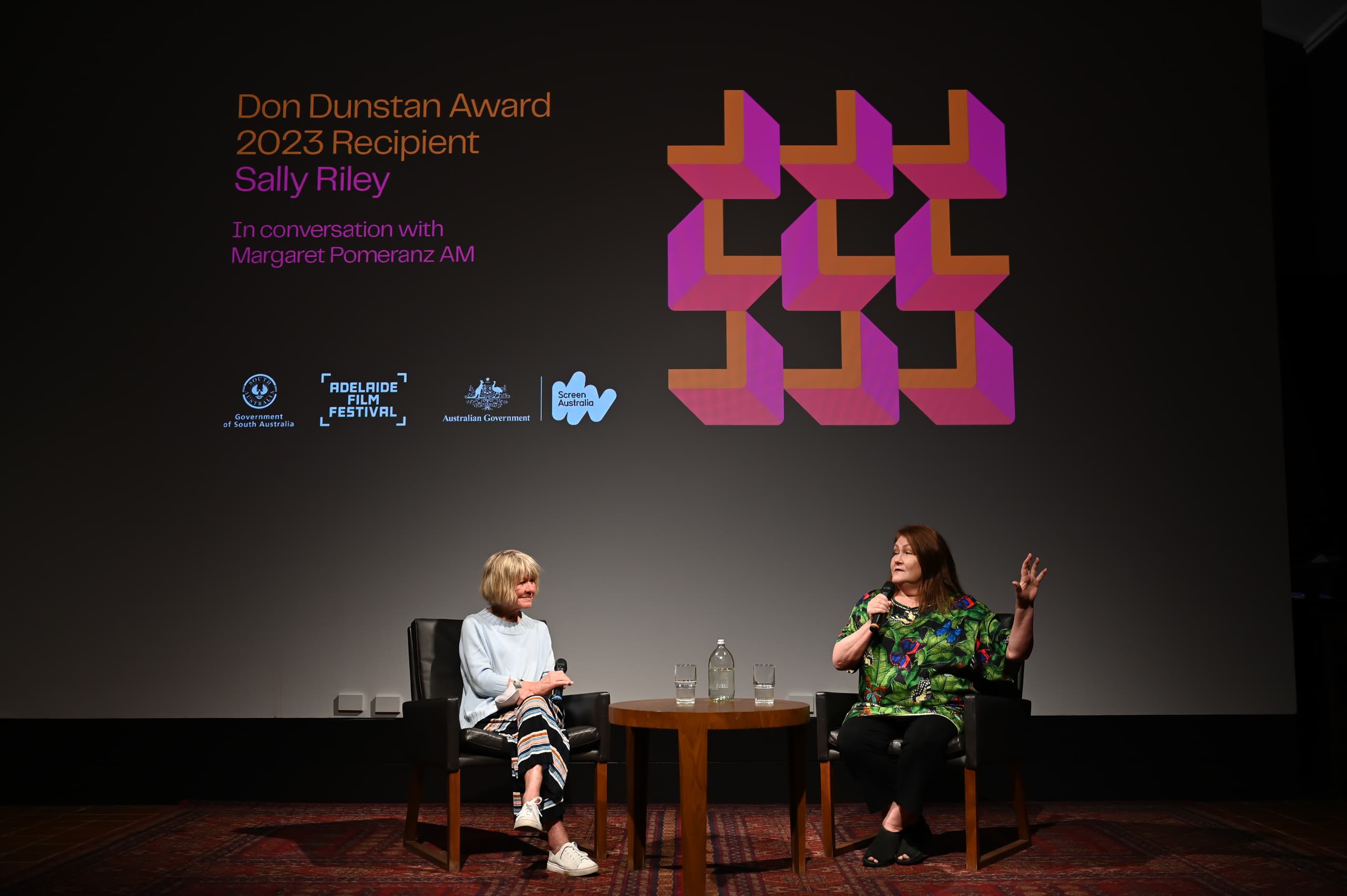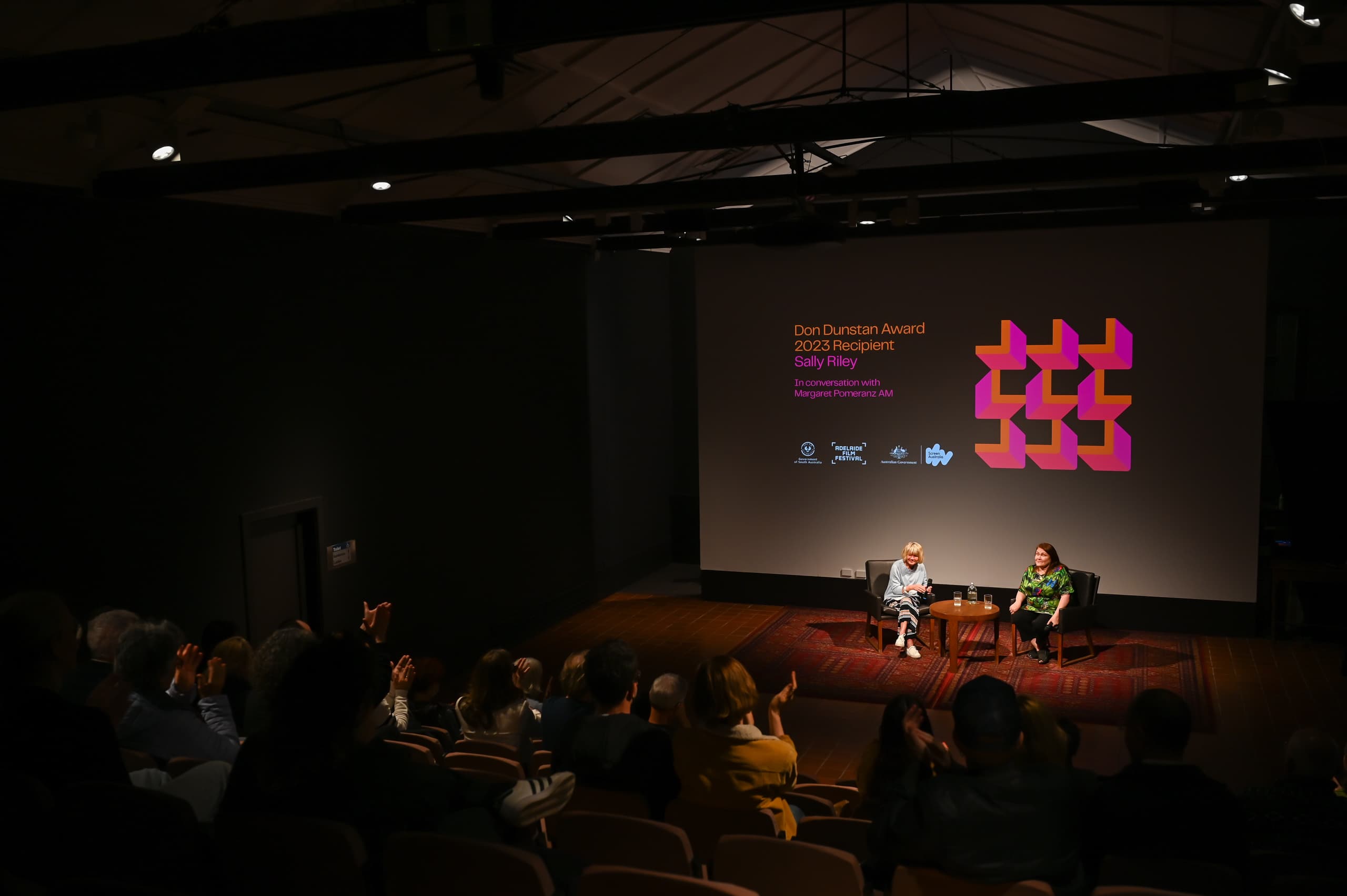
AFF 2023 Don Dunstan Award
Festival Info
AFF 2023 Don Dunstan Award
Sally RileyAFF 2023 Don Dunstan Award Recipient
Wiradjuri woman Sally Riley has always been a robust voice for Aboriginal representation in the film industry. Until recently she was ABC’s Head of Drama and Entertainment, Sally also served as the Executive Producer on both the award-winning film Mabo and the acclaimed series Redfern Now – the first television drama commissioned, written, acted and produced by Indigenous Australians.
In the annual Don Dunstan Award essay, distinguished Professor Larissa Behrendt AO reflects on Sally Riley’s robust voice for Aboriginal representation in the film industry.
“Sally Riley’s legacy goes beyond the content she has commissioned on the screen. It goes to the capacity building of First Nations creatives in the film and television industry and in seeing First Nations stories becoming central in the national narrative. This legacy also tracks the move from Indigenous people being peripheral to Australian storytelling, to commanding the stories told about us.”

A Legacy Behind The LinesEssay
Professor Larissa Behrendt AO, reflects on Sally Riley’s robust voice for Aboriginal representation in the film industry in the annual Don Dunstan Award Essay.
If one was to make a list of the most significant moments in Australian film and television in the last twenty years, it would include Samson and Delilah, First Australians, Redfern Now, the Mystery Road franchise, Redfern Now, Black Comedy and Total Control. Sally Riley has had a hand in all of these productions and the creative forces behind them, including Warwick Thornton, Wayne Blair, Rachel Perkins and Darren Dale.
Sally began her transformative work when she was appointed, in 2000, as head of the Indigenous Branch of the Australian Film Commission. She would helm this division and guide its evolution into the Indigenous Department of Screen Australia. It was here she was able to support a first wave of First Nations film makers.
Sally also began her work in reshaping the way that the Australian screen industry engaged with First Nations content. She had a leading role in leading the development of the handbook, Pathways and Protocols – a filmmaker’s guide to working with Indigenous people, culture and concepts which challenged non-Indigenous filmmakers to work more respectfully in the way they engaged with Indigenous content and consulted with Indigenous people about what was being created for the screen. Sally always understood that it wasn’t just about getting greater visibility of First Nations people and stories on the screen; it mattered how those stories were told. And it was essential that First Nations people were the drivers and key creatives in telling those stories.
Building the capacity within the screen industry wasn’t just about creating jobs. It was part of a guiding belief in the need for First Nations stories to be told by First Nations people. When Sally started at the Australian Film Commission, Indigenous stories were told by non-Indigenous people and these were inevitably stories and characterisations that were tainted with a colonial lens and saw characters too often slip into stereotypes.
What Sally began at the Australian Film Commission / Screen Australia, she continued when she joined the ABC to head the Indigenous Unit. What would follow were the creation of a greater space for First Nations projects – and into that space would come projects that expanded the way First Nations stories were told.
With shows like Cleverman, Preppers, Kiki and Kitty, Blue Water Empire and Total Control, Sally continued to challenge First Nations creatives to push the boundaries of the stories they were telling and the characters they were creating. She always wants to see stories that haven’t been told before. But her vision was greater than that – she wanted to develop the capacity of First Nations people in the industry – as writers, directors, producers, cinematographers, editors, across every aspect of the process. The ground-breaking Redfern Now, which Sally commissioned, was a perfect encapsulation of this. It was the first drama series to be written, produced and primarily performed by Indigenous Australians.
Sally is skilled at creating the space for First Nations creatives to find their voice and develop their craft. She would steward and guide, demanding the high level of content that she knew First Nations people were capable of producing. Her influence is in the background but can clearly be seen. A favourite example for me of this was her Executive Producing role in Black Comedy. It was, like Redfern Now, a showcase for First Nations talent, bringing people like Nakkiah Lui, Steven Oliver and Aaron Fa’aoso to a broader audience, while also incubating a new generation of First Nations screenwriters and giving First Nations producers a chance to gain experience and screen credits. One of the recurring sketches, ‘The Real Housewives of Narromine’ was a deliberate tribute to Sally, referencing her home town in a wink.
It is clear that Sally Riley’s legacy goes beyond the content she has commissioned on the screen. It goes to the capacity building of First Nations creatives in the film and television industry and in seeing First Nations stories becoming central in the national narrative. Her work contributed significantly to moving Indigenous people from the peripheral of Australian storytelling to the centre – and insisting that those stories be told by us.
Taken as a whole, it is an impressive contribution to the development of First Nations talent and storytelling. But with her promotion to ABC’s Head of Scripted and then as Head of Drama, Entertainment and Indigenous, Sally was also responsible for a much broader contribution to Australian storytelling and screen industry. She commissioned and Executive Produced shows such as Wakefield, Fires, Janet King, Glitch, In Our Blood and The Heights. There was more diversity and the screen and women were increasingly prominent in creative roles.
Sally’s appointment as the Head of Drama, Entertainment and Indigenous was not just a reflection on the impressive career she had built but reflected a meaningful way in which First Nations influence, perspective and decision making was moved from the periphery to the centre within the national broadcaster. It was worth noting, that as Sally broke through glass ceilings, she was replicating in her professional role what she had achieved through her broader influence along her career pathway.
Indigenous storytelling and creatives have also moved from the peripheral and marginal to the centre as a part of the world that Sally had created.
Like almost every First Nations working in Australia’s screen industry, Sally played a role in supporting my career and giving me some big breaks. I was lucky enough to have worked under Sally at the ABC in my role as host of Speaking Out which sat within her Indigenous portfolio. Through this role I have developed my storytelling and interviewing skills. Sally was Executive Producer of Maralinga Tjarutja, a film on the impact of colonisation and nuclear testing on the people living in the Maralinga area, and she supported my being brought on as director, a major career boost. She was also Executive Producer of The Heights – the first television show that I wrote an episode for, and then Total Control when I got the opportunity to write Season 2.
In addition to that, And Sally was on the board of NITV in its early days when I was Chairing it. Sally’s experience and commitment to the capacity building of the industry were critical assets in setting up an important platform for the further support of First Nations content makers It was clear from getting the opportunity to work with Sally in this context what a unique skill set she had developed to progress her passion for the continual building of storytelling for the screen.
Through these more personal interactions I got to see up close Sally’s commitment to building and nurturing the First Nations screen industry and First Nations storytelling in a broader sense and to feel the generosity of the support she has given to those of us who have aspired to work in the industry.
In January 2023, the Australian Government released a new National Cultural Policy. The first pillar of that policy is First Nations First. When I was growing up, there were no First Nations people on television. It was before Aaron Pedersen, Ernie Dingo and then Deborah Mailman would become screen regulars. To have our key cultural policy now put First Nations stories on centre stage within the national arts policy was something that seemed unimaginable. It is now a reality but it is hard to see how that could come to be without the groundwork done by the commitment of First Nations people to building vibrant film, arts and cultural sectors over the past few decades. Sally has been central to that aspiration.
While this is an excellent opportunity to look back and reflect on the enormous contribution that Sally has made to the screen industry and the empowerment of First Nations creatives to tell First Nations stories – and what a powerful, unrivalled legacy it is – one feels certain that there are still several more acts to play out in the Sally Riley story.
